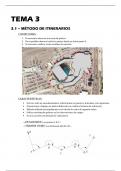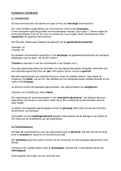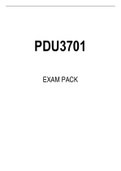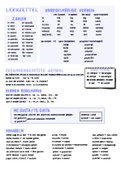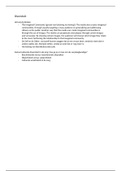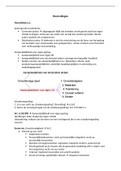OBS 114
18 April 2023 12:52
CHAPTER 6: DECISION MAKING AND CREATIVITY
• Decision making-the process by which managers respond to opportunities and threats by analysing options and making determinations
about specific organisational goals and courses of action.
1. In response to opportunities occurs when managers search for ways to improve organisational performance to benefit customers,
employees and other stakeholder groups.
2. In response to threats occurs when events inside or outside the organisation adversely affect organisational performance and managers
search for ways to increase performance.
• Programmed decision making-routine, virtually automatic decision making that follows established rules or guidelines.
-are decisions that have been made so many times in the past that managers develop rules and guidelines that are applied to ce rtain
situations inevitably occur (i.e. policy).
• Non-programmed decision making-nonroutine decision making that occurs in response to unusual, unpredictable opportunities and threats
(i.e. invest in new technology).
-occurs when there is no ready-made decision rules and guidelines managers applies to a situation and the rules do not exist because the
situation might be unexpected or uncertain to a point where the managers lack information they need to develop rules to cover the
situation.
How Do Managers Make Decisions In The Absence Of Decision Rules?
1. Intuition-feelings, beliefs and hunches that come readily to mind, require little effort and information gathering and result in on -the-spot
decisions.
-managers rely on their intuition when it comes to making decisions in the absence of decision rules.
2. Reasoned judgment-a decision that requires time and effort and results from careful information gathering, generation of alternatives and
evaluation of alternatives.
-managers use reasoned judgment in absence of decision rules.
3. "exercising" one's judgment is more rational process than "going with" one's intuition.
Decision Making Theories: The Classic Model:
• Classic model- a perspective approach to decision making based on the assumption that the decision maker can identify and evaluate all the
possible alternatives and their consequences and rationally choose the most appropriate course of action.
-this model helps reveal the factors managers and ither decision makers should be aware of to improve the quality of their dec ision making.
• Optimum decision-the most appropriate decision in light of what managers believe to be the most desirable consequences for the
organization.
-the managers can list their own preferences for each alternative and will rank their preferences from the least to the most t o make an
optimum decision.
Decision Making Theories: The Administrative Model:
Administrative model-an approach to decision making that explains why decision making is inherently uncertain and risky and why managers
usually make satisfactory rather than optimum decisions.
• Bounded rationality- cognitive limitations that constrain one's ability to interpret, process and act on information.
-it is very difficult for managers to even come close to evaluating all the vast information they had to identify before the m ake a decision.
• Incomplete information-information is incomplete because the full range of decision-making alternatives is unknowable and consequences
OBS 114 CHAPTER 6 Page 1
, • Incomplete information-information is incomplete because the full range of decision-making alternatives is unknowable and consequences
are uncertain.
-managers find it difficult to make an optimum decision because they would have incomplete information although they have unli mited
abilities to evaluate the information.
Factors To Why Information Is Incomplete:
1. Risk and uncertainty
• Risk-the degree of probability that the possible outcomes of a particular course of action will occur.
-managers know the possible outcomes when they are taking a risk for a particular course of action and can assign probabilitie s to them.
• Uncertainty-unpredictability
-when uncertainty is there , the probabilities of alternatives cannot be determined because the future outcomes are unknown t herefore
there is little information for the managers to make a decision.
2. Ambiguous information
• Ambiguous information-information that can be interpreted in multiple and often conflicting ways.
-managers find it hard to make a decision because the information is not clear even though it can be interpreted in numerous a nd conflicting
ways.
3. Time constraints and information costs
• This where managers do not have enough money nor time to search for all possible alternative solutions and evaluate all the p otential
consequences of those alternatives.
• Satisficing-searching for and choosing an acceptable or satisfactory response to problems and opportunities rather than trying to make t he
best decision.
Decision Making Process:
• Some stimuli become apparent because it changes in the organisational environment result in new forms of opportunities or thr eats.
• The stimuli that sparks decision making are most likely to result from the actions of managers inside an organisation as they are from
changes in the external environment.
• Often become apparent because changes in the organisational environment result in new kinds of opportunities and threats.
• Generate a set of feasible alternative courses of action to take in response to the opportunity or threat.
• Management experts cite failure to properly generate and consider different alternatives as one reason that managers sometime s make bad
decisions.
• The one major problem managers find it difficult is coming up with creative alternative solutions to specific problems and al so view
problems from a fresh perspective.
• Managers should set aside their mental models of the world and generate creative alternatives that will reflect in the growth of interest in
the work.
• The key to a good assessment is to define the opportunity or threat exactly and to set criteria that should influence the sel ection.
• One reason for bad decisions is that managers often fail to specify the criteria.
OBS 114 CHAPTER 6 Page 2
18 April 2023 12:52
CHAPTER 6: DECISION MAKING AND CREATIVITY
• Decision making-the process by which managers respond to opportunities and threats by analysing options and making determinations
about specific organisational goals and courses of action.
1. In response to opportunities occurs when managers search for ways to improve organisational performance to benefit customers,
employees and other stakeholder groups.
2. In response to threats occurs when events inside or outside the organisation adversely affect organisational performance and managers
search for ways to increase performance.
• Programmed decision making-routine, virtually automatic decision making that follows established rules or guidelines.
-are decisions that have been made so many times in the past that managers develop rules and guidelines that are applied to ce rtain
situations inevitably occur (i.e. policy).
• Non-programmed decision making-nonroutine decision making that occurs in response to unusual, unpredictable opportunities and threats
(i.e. invest in new technology).
-occurs when there is no ready-made decision rules and guidelines managers applies to a situation and the rules do not exist because the
situation might be unexpected or uncertain to a point where the managers lack information they need to develop rules to cover the
situation.
How Do Managers Make Decisions In The Absence Of Decision Rules?
1. Intuition-feelings, beliefs and hunches that come readily to mind, require little effort and information gathering and result in on -the-spot
decisions.
-managers rely on their intuition when it comes to making decisions in the absence of decision rules.
2. Reasoned judgment-a decision that requires time and effort and results from careful information gathering, generation of alternatives and
evaluation of alternatives.
-managers use reasoned judgment in absence of decision rules.
3. "exercising" one's judgment is more rational process than "going with" one's intuition.
Decision Making Theories: The Classic Model:
• Classic model- a perspective approach to decision making based on the assumption that the decision maker can identify and evaluate all the
possible alternatives and their consequences and rationally choose the most appropriate course of action.
-this model helps reveal the factors managers and ither decision makers should be aware of to improve the quality of their dec ision making.
• Optimum decision-the most appropriate decision in light of what managers believe to be the most desirable consequences for the
organization.
-the managers can list their own preferences for each alternative and will rank their preferences from the least to the most t o make an
optimum decision.
Decision Making Theories: The Administrative Model:
Administrative model-an approach to decision making that explains why decision making is inherently uncertain and risky and why managers
usually make satisfactory rather than optimum decisions.
• Bounded rationality- cognitive limitations that constrain one's ability to interpret, process and act on information.
-it is very difficult for managers to even come close to evaluating all the vast information they had to identify before the m ake a decision.
• Incomplete information-information is incomplete because the full range of decision-making alternatives is unknowable and consequences
OBS 114 CHAPTER 6 Page 1
, • Incomplete information-information is incomplete because the full range of decision-making alternatives is unknowable and consequences
are uncertain.
-managers find it difficult to make an optimum decision because they would have incomplete information although they have unli mited
abilities to evaluate the information.
Factors To Why Information Is Incomplete:
1. Risk and uncertainty
• Risk-the degree of probability that the possible outcomes of a particular course of action will occur.
-managers know the possible outcomes when they are taking a risk for a particular course of action and can assign probabilitie s to them.
• Uncertainty-unpredictability
-when uncertainty is there , the probabilities of alternatives cannot be determined because the future outcomes are unknown t herefore
there is little information for the managers to make a decision.
2. Ambiguous information
• Ambiguous information-information that can be interpreted in multiple and often conflicting ways.
-managers find it hard to make a decision because the information is not clear even though it can be interpreted in numerous a nd conflicting
ways.
3. Time constraints and information costs
• This where managers do not have enough money nor time to search for all possible alternative solutions and evaluate all the p otential
consequences of those alternatives.
• Satisficing-searching for and choosing an acceptable or satisfactory response to problems and opportunities rather than trying to make t he
best decision.
Decision Making Process:
• Some stimuli become apparent because it changes in the organisational environment result in new forms of opportunities or thr eats.
• The stimuli that sparks decision making are most likely to result from the actions of managers inside an organisation as they are from
changes in the external environment.
• Often become apparent because changes in the organisational environment result in new kinds of opportunities and threats.
• Generate a set of feasible alternative courses of action to take in response to the opportunity or threat.
• Management experts cite failure to properly generate and consider different alternatives as one reason that managers sometime s make bad
decisions.
• The one major problem managers find it difficult is coming up with creative alternative solutions to specific problems and al so view
problems from a fresh perspective.
• Managers should set aside their mental models of the world and generate creative alternatives that will reflect in the growth of interest in
the work.
• The key to a good assessment is to define the opportunity or threat exactly and to set criteria that should influence the sel ection.
• One reason for bad decisions is that managers often fail to specify the criteria.
OBS 114 CHAPTER 6 Page 2



